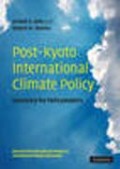
Post-Kyoto international climate policy: summary for policymakers
Aldy, Joseph E.
Stavins, Robert N.
The Harvard Project on International Climate Agreements seeks to identify keydesign elements of a scientifically sound, economically rational, and politically pragmatic post-2012 international policy architecture for global climate change. It draws upon leading thinkers from academia, private industry, government, and non-governmental organizations from around the world to construct a small set of promising policy frameworks and then disseminate and discuss the design elements and frameworks with decision-makers. The Project is directed by Robert N. Stavins, Albert Pratt Professor of Business and Government, John F. Kennedy School of Government, Harvard University. For more information, see the Project's website: http://belfercenter.ksg.harvard.edu/climate INDICE: International Advisory Board, Harvard Environmental Economics Program; Faculty Steering Committee, Harvard Project on International Climate Agreements; Management, Harvard Project on International Climate Agreements; List of contributors; Foreword; Introduction and overview; Lessons for the International Policy Community; References; Appendix 1. Summaries of research initiatives, Harvard Project on International Climate Agreements; Part I. Alternative International Policy Architectures: 1. An elaborated proposal for global climate policy architecture: specific formulas and emission targets for all countries in all decades; 2. The EU emission trading scheme: a prototype global system?; 3. Linkage of tradable permit systems in international climate policy architecture; 4. The case for charges on greenhouse gas emissions; 5. Towards a global compact for managing climate change; 6. Sectoral approaches to a post-Kyoto international climate policy framework; 7. A portfolio system of climate treaties; Part II. Negotiation, Assessment, and Compliance: 8. How to negotiate and update climate agreements; 9. Metrics for evaluating policy commitments ina fragmented world: the challenges of equity and integrity; 10. Justice and climate change; 11. Toward a post-Kyoto climate change architecture: a political analysis; Part III. The Role and Means of Technology Transfer: 12. International climate technology strategies; 13. Mitigation through resource transfers to developing countries: expanding greenhouse gas offsets; 14. Possible development of a technology clean development mechanism in a post 2012 regime; Part IV. Global Climate Policy and International Trade: 15. Global environment and trade policy; 16. A proposal for the design of the successor to the Kyoto protocol; Part V. Economic Development, Adaptation, and Deforestation: 17. Reconciling human development and climate protection: a multi-stage hybrid climate policy architecture; 18. What do we expect from an international climate agreement? A perspective from a low-income country; 19. Climate accession deals: new strategies for taming growth of greenhouse gases in developing countries; 20. Policies for developing country engagement; 21. International forest carbon sequestration in a post-Kyoto agreement; Part VI. Modeling Impacts of Alternative Allocations of Responsibility: 22. Modeling economic impacts of alternative international climate policy architectures: a quantitative and comparative assessment of architectures for agreement; 23. Sharing the burden of GHG reductions; 24. When technology and climate policy meet: energy technology in an international policy context; 25. Revised emissions projections for China: why post-Kyoto climate policy must look east; 26. Expecting the unexpected: macroeconomic volatility and climate policy; Part VII. Epilogue: 27. Epilogue: implementing architectures for agreement; Appendix 2. Selected list of individuals consulted, Harvard Project on International Climate Agreements; Appendix 3. Workshops and conferences, Harvard Project on International Climate Agreements; Appendix 4. Glossary and abbreviations.
- ISBN: 978-0-521-13800-0
- Editorial: Cambridge University
- Encuadernacion: Rústica
- Páginas: 210
- Fecha Publicación: 06/08/2009
- Nº Volúmenes: 1
- Idioma: Inglés
